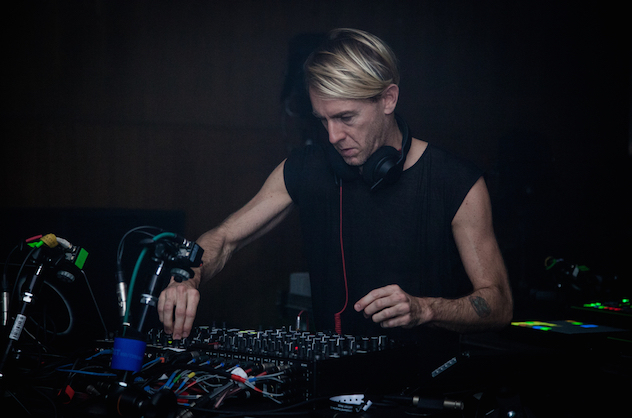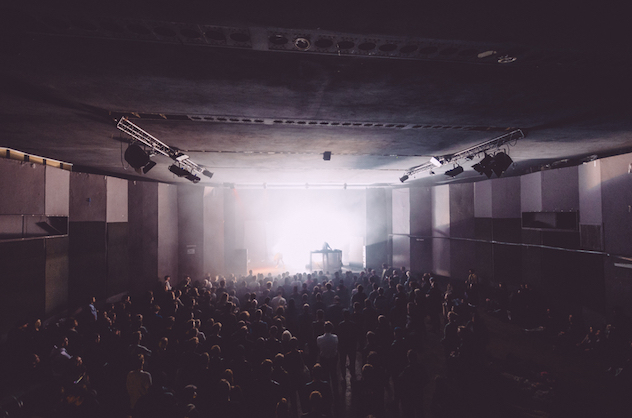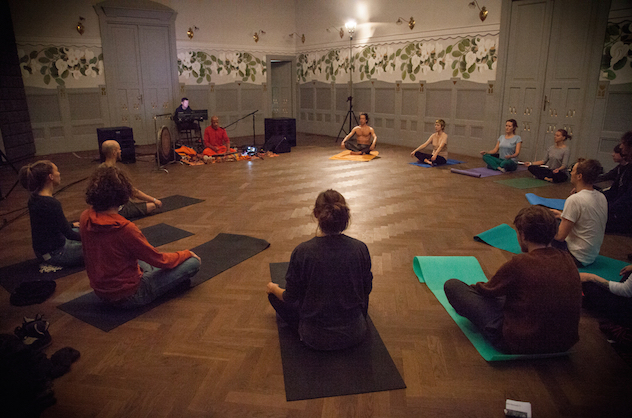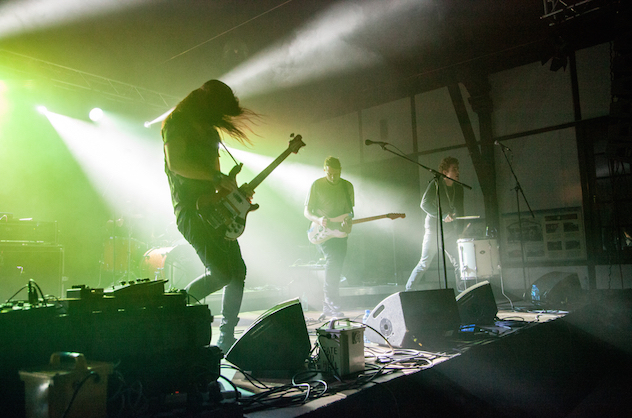- Around 8:30 PM last Thursday evening, I received a text from a colleague. "Was it Burial?" I was communicating with him from the depths of a 13th-century salt mine, the idea of which initially threw me more than the message itself. Then I realised: he possibly knew more about what I had—or hadn't—just seen than I did. About an hour before, following a warm-up of drone and ambient from DJ Richard, the vast events space at Wieliczka had been plunged into darkness save for two rows of salt-crystal chandeliers. It appeared as though someone was performing on stage, but it was hard to tell. A figure on a balcony at the back of the room was nodding to the low-frequency gurgles and weather noises, but that was the lighting guy, right? "Ah, the mystery guest is playing a Burial track," I thought to myself. "Wait. Another one?" Theories and counter theories soon spread. Kode9, the Hyperdub boss, has played all-Burial sets in the past (a tweet from the label left this possibility open) or it could have all been an elaborate hoax. People told me they were convinced it was Burial based on little more than a hunch. Festival organisers were keeping tight-lipped: "No comment," they later said.
This confusion stemmed from Unsound's 2015 theme: surprise. "The aim is to play with preconceptions about festival formats, live performance and the very idea of going out to see music," they said. About 30% of the lineup was unannounced, which extended to the music performances, talks and the films shown in a movie marathon. Once a surprise act had performed, the festival posted a photo of him or her to its Facebook page. Unsound, which takes place annually in the Polish city of Kraków, always has a theme—"horror," "the dream"—but it's unlikely it's ever had such a bearing on the overall experience.
 Burial saga aside, Richie Hawtin's appearance was the biggest curveball Unsound threw. He took a spot in the second room of Hotel Forum, the main nighttime venue, between Romans (Gunnar Haslam and Tin Man) and the Polish techno artist Jacek Sienkiewicz. It was novel to see him play such an intimate environment, but his set was a fairly standard run-through of the hi-def tech house he pushes these days. Down the opposite end of the intensity scale, Lawrence English was a nice early surprise on the Monday night. He asked everybody at Manggha, the museum that serves as a main venue for the first few days of the festival, to lie on the floor before playing an hour of oceanic ambient. Powell and Lorenzo Senni, whose collaboration was both unannounced and a project debut, blended the former's scuzzy electronics with the latter's soaring synths to convincing effect. Another unannounced highlight at Hotel Forum was Kode9, who worked upwards from the grime of JME to the footwork of DJ Rashad—his mixing was breakneck, his track selection impeccable. King Midas Sound and Fennesz, who followed "Burial" as the surprise headliner at Wieliczka, played a technically competent set that didn't resonate with the audience. More successful was Helm's poised and powerful set with a dancer at Rotunda. A couple of people were curled up asleep as the muscle-bound, pharaoh-like figure writhed to Helm's dense drone passages.
Burial saga aside, Richie Hawtin's appearance was the biggest curveball Unsound threw. He took a spot in the second room of Hotel Forum, the main nighttime venue, between Romans (Gunnar Haslam and Tin Man) and the Polish techno artist Jacek Sienkiewicz. It was novel to see him play such an intimate environment, but his set was a fairly standard run-through of the hi-def tech house he pushes these days. Down the opposite end of the intensity scale, Lawrence English was a nice early surprise on the Monday night. He asked everybody at Manggha, the museum that serves as a main venue for the first few days of the festival, to lie on the floor before playing an hour of oceanic ambient. Powell and Lorenzo Senni, whose collaboration was both unannounced and a project debut, blended the former's scuzzy electronics with the latter's soaring synths to convincing effect. Another unannounced highlight at Hotel Forum was Kode9, who worked upwards from the grime of JME to the footwork of DJ Rashad—his mixing was breakneck, his track selection impeccable. King Midas Sound and Fennesz, who followed "Burial" as the surprise headliner at Wieliczka, played a technically competent set that didn't resonate with the audience. More successful was Helm's poised and powerful set with a dancer at Rotunda. A couple of people were curled up asleep as the muscle-bound, pharaoh-like figure writhed to Helm's dense drone passages.
 Beyond the unannounced sets, Unsound packed in plenty of twists, the tone for which was set when they were accused of promoting Satanism in the lead up to the festival. Elysia Crampton, an artist who plenty of people seemed keen to unpack, interspersed her songs with readings from her own impenetrable academic texts, and followed the set with a talk on "landscape, place [and] history" the following day. Unsound's talks—like most on the festival circuit, if we're honest—are prone to meandering inconclusively, but Adam Harper's lecture on digital accelerationism in underground music did feature both some tangible points and discussion on beards. Laraaji, the new age artist whose work has recently received a fresh wave of interest, hosted a series of yoga classes called Peace Garden, while Tim Hecker fully realised the multi-sensory Ephemera project he's been working on for Unsound, with two sessions that were described to me as the most visually intense experience people could remember (I'm still smarting about missing it).
Beyond the unannounced sets, Unsound packed in plenty of twists, the tone for which was set when they were accused of promoting Satanism in the lead up to the festival. Elysia Crampton, an artist who plenty of people seemed keen to unpack, interspersed her songs with readings from her own impenetrable academic texts, and followed the set with a talk on "landscape, place [and] history" the following day. Unsound's talks—like most on the festival circuit, if we're honest—are prone to meandering inconclusively, but Adam Harper's lecture on digital accelerationism in underground music did feature both some tangible points and discussion on beards. Laraaji, the new age artist whose work has recently received a fresh wave of interest, hosted a series of yoga classes called Peace Garden, while Tim Hecker fully realised the multi-sensory Ephemera project he's been working on for Unsound, with two sessions that were described to me as the most visually intense experience people could remember (I'm still smarting about missing it).
 At Hotel Forum, the quirks came mainly in audio form. Nisennenmondai, the militantly 4/4 Japanese trio, and Shackleton, the rhythmic explorer, somehow found a satisfying middle ground between their sounds—something that eluded Rabit and Kuedo. Jlin sounded Shackleton-esque at times during her standout live set, which was made even more special because it was both her live and European debut. Colin Self's vocals and dancing made an already great Holly Herndon live show even greater (bonus points for Herndon's on-screen political barbs such as "fuck the NSA, seriously") while Surgeon and Lady Gaga collaborator Starlight continued their unlikely allegiance with an unfussy, tough techno workout. Unsound has a strong track record of giving a platform to fresh club sounds, and this year it felt like the turn of Lexxi, Endgame, Angel-Ho and Nkisi. Lexxi and Endgame's early back-to-back set found a sweet spot between deconstructionism and dance floor utility, but at times it was tough to connect with Angel-Ho's harsh, dislocated expressions. In same space, the likes of DJ Firmeza, RP Boo and UNiQU3 got people sweating with high-intensity, hyper-local sounds.
At Hotel Forum, the quirks came mainly in audio form. Nisennenmondai, the militantly 4/4 Japanese trio, and Shackleton, the rhythmic explorer, somehow found a satisfying middle ground between their sounds—something that eluded Rabit and Kuedo. Jlin sounded Shackleton-esque at times during her standout live set, which was made even more special because it was both her live and European debut. Colin Self's vocals and dancing made an already great Holly Herndon live show even greater (bonus points for Herndon's on-screen political barbs such as "fuck the NSA, seriously") while Surgeon and Lady Gaga collaborator Starlight continued their unlikely allegiance with an unfussy, tough techno workout. Unsound has a strong track record of giving a platform to fresh club sounds, and this year it felt like the turn of Lexxi, Endgame, Angel-Ho and Nkisi. Lexxi and Endgame's early back-to-back set found a sweet spot between deconstructionism and dance floor utility, but at times it was tough to connect with Angel-Ho's harsh, dislocated expressions. In same space, the likes of DJ Firmeza, RP Boo and UNiQU3 got people sweating with high-intensity, hyper-local sounds.
 I've said this in past Unsound reviews, but it's worth repeating that the stable, unsurprising elements of the festival play an enormous role in the enjoyment of it. Kraków is lovely and is the ideal size for an event like Unsound (I twice left a dinner table and walked two blocks to catch noise rock from Health and Liturgy at Muzeum Inżynierii Miejskiej). The crowds—which at a guess are 75% Polish—are usually warm and open-minded. Everything is cheap. You'll pay €1.75 for a beer at Hotel Forum, no more than a few euro for most taxi rides, and the food, which is often delicious, is just as cost effective. The city provides the platform from which Unsound takes the risks that have made it one of Europe's preeminent music festivals.
Photo credit: Anna Spysz (All except Rotunda), Camille Blake (Rotunda)
Angus Finlayson contributed to this piece
I've said this in past Unsound reviews, but it's worth repeating that the stable, unsurprising elements of the festival play an enormous role in the enjoyment of it. Kraków is lovely and is the ideal size for an event like Unsound (I twice left a dinner table and walked two blocks to catch noise rock from Health and Liturgy at Muzeum Inżynierii Miejskiej). The crowds—which at a guess are 75% Polish—are usually warm and open-minded. Everything is cheap. You'll pay €1.75 for a beer at Hotel Forum, no more than a few euro for most taxi rides, and the food, which is often delicious, is just as cost effective. The city provides the platform from which Unsound takes the risks that have made it one of Europe's preeminent music festivals.
Photo credit: Anna Spysz (All except Rotunda), Camille Blake (Rotunda)
Angus Finlayson contributed to this piece
 Burial saga aside, Richie Hawtin's appearance was the biggest curveball Unsound threw. He took a spot in the second room of Hotel Forum, the main nighttime venue, between Romans (Gunnar Haslam and Tin Man) and the Polish techno artist Jacek Sienkiewicz. It was novel to see him play such an intimate environment, but his set was a fairly standard run-through of the hi-def tech house he pushes these days. Down the opposite end of the intensity scale, Lawrence English was a nice early surprise on the Monday night. He asked everybody at Manggha, the museum that serves as a main venue for the first few days of the festival, to lie on the floor before playing an hour of oceanic ambient. Powell and Lorenzo Senni, whose collaboration was both unannounced and a project debut, blended the former's scuzzy electronics with the latter's soaring synths to convincing effect. Another unannounced highlight at Hotel Forum was Kode9, who worked upwards from the grime of JME to the footwork of DJ Rashad—his mixing was breakneck, his track selection impeccable. King Midas Sound and Fennesz, who followed "Burial" as the surprise headliner at Wieliczka, played a technically competent set that didn't resonate with the audience. More successful was Helm's poised and powerful set with a dancer at Rotunda. A couple of people were curled up asleep as the muscle-bound, pharaoh-like figure writhed to Helm's dense drone passages.
Burial saga aside, Richie Hawtin's appearance was the biggest curveball Unsound threw. He took a spot in the second room of Hotel Forum, the main nighttime venue, between Romans (Gunnar Haslam and Tin Man) and the Polish techno artist Jacek Sienkiewicz. It was novel to see him play such an intimate environment, but his set was a fairly standard run-through of the hi-def tech house he pushes these days. Down the opposite end of the intensity scale, Lawrence English was a nice early surprise on the Monday night. He asked everybody at Manggha, the museum that serves as a main venue for the first few days of the festival, to lie on the floor before playing an hour of oceanic ambient. Powell and Lorenzo Senni, whose collaboration was both unannounced and a project debut, blended the former's scuzzy electronics with the latter's soaring synths to convincing effect. Another unannounced highlight at Hotel Forum was Kode9, who worked upwards from the grime of JME to the footwork of DJ Rashad—his mixing was breakneck, his track selection impeccable. King Midas Sound and Fennesz, who followed "Burial" as the surprise headliner at Wieliczka, played a technically competent set that didn't resonate with the audience. More successful was Helm's poised and powerful set with a dancer at Rotunda. A couple of people were curled up asleep as the muscle-bound, pharaoh-like figure writhed to Helm's dense drone passages.
 Beyond the unannounced sets, Unsound packed in plenty of twists, the tone for which was set when they were accused of promoting Satanism in the lead up to the festival. Elysia Crampton, an artist who plenty of people seemed keen to unpack, interspersed her songs with readings from her own impenetrable academic texts, and followed the set with a talk on "landscape, place [and] history" the following day. Unsound's talks—like most on the festival circuit, if we're honest—are prone to meandering inconclusively, but Adam Harper's lecture on digital accelerationism in underground music did feature both some tangible points and discussion on beards. Laraaji, the new age artist whose work has recently received a fresh wave of interest, hosted a series of yoga classes called Peace Garden, while Tim Hecker fully realised the multi-sensory Ephemera project he's been working on for Unsound, with two sessions that were described to me as the most visually intense experience people could remember (I'm still smarting about missing it).
Beyond the unannounced sets, Unsound packed in plenty of twists, the tone for which was set when they were accused of promoting Satanism in the lead up to the festival. Elysia Crampton, an artist who plenty of people seemed keen to unpack, interspersed her songs with readings from her own impenetrable academic texts, and followed the set with a talk on "landscape, place [and] history" the following day. Unsound's talks—like most on the festival circuit, if we're honest—are prone to meandering inconclusively, but Adam Harper's lecture on digital accelerationism in underground music did feature both some tangible points and discussion on beards. Laraaji, the new age artist whose work has recently received a fresh wave of interest, hosted a series of yoga classes called Peace Garden, while Tim Hecker fully realised the multi-sensory Ephemera project he's been working on for Unsound, with two sessions that were described to me as the most visually intense experience people could remember (I'm still smarting about missing it).
 At Hotel Forum, the quirks came mainly in audio form. Nisennenmondai, the militantly 4/4 Japanese trio, and Shackleton, the rhythmic explorer, somehow found a satisfying middle ground between their sounds—something that eluded Rabit and Kuedo. Jlin sounded Shackleton-esque at times during her standout live set, which was made even more special because it was both her live and European debut. Colin Self's vocals and dancing made an already great Holly Herndon live show even greater (bonus points for Herndon's on-screen political barbs such as "fuck the NSA, seriously") while Surgeon and Lady Gaga collaborator Starlight continued their unlikely allegiance with an unfussy, tough techno workout. Unsound has a strong track record of giving a platform to fresh club sounds, and this year it felt like the turn of Lexxi, Endgame, Angel-Ho and Nkisi. Lexxi and Endgame's early back-to-back set found a sweet spot between deconstructionism and dance floor utility, but at times it was tough to connect with Angel-Ho's harsh, dislocated expressions. In same space, the likes of DJ Firmeza, RP Boo and UNiQU3 got people sweating with high-intensity, hyper-local sounds.
At Hotel Forum, the quirks came mainly in audio form. Nisennenmondai, the militantly 4/4 Japanese trio, and Shackleton, the rhythmic explorer, somehow found a satisfying middle ground between their sounds—something that eluded Rabit and Kuedo. Jlin sounded Shackleton-esque at times during her standout live set, which was made even more special because it was both her live and European debut. Colin Self's vocals and dancing made an already great Holly Herndon live show even greater (bonus points for Herndon's on-screen political barbs such as "fuck the NSA, seriously") while Surgeon and Lady Gaga collaborator Starlight continued their unlikely allegiance with an unfussy, tough techno workout. Unsound has a strong track record of giving a platform to fresh club sounds, and this year it felt like the turn of Lexxi, Endgame, Angel-Ho and Nkisi. Lexxi and Endgame's early back-to-back set found a sweet spot between deconstructionism and dance floor utility, but at times it was tough to connect with Angel-Ho's harsh, dislocated expressions. In same space, the likes of DJ Firmeza, RP Boo and UNiQU3 got people sweating with high-intensity, hyper-local sounds.
 I've said this in past Unsound reviews, but it's worth repeating that the stable, unsurprising elements of the festival play an enormous role in the enjoyment of it. Kraków is lovely and is the ideal size for an event like Unsound (I twice left a dinner table and walked two blocks to catch noise rock from Health and Liturgy at Muzeum Inżynierii Miejskiej). The crowds—which at a guess are 75% Polish—are usually warm and open-minded. Everything is cheap. You'll pay €1.75 for a beer at Hotel Forum, no more than a few euro for most taxi rides, and the food, which is often delicious, is just as cost effective. The city provides the platform from which Unsound takes the risks that have made it one of Europe's preeminent music festivals.
Photo credit: Anna Spysz (All except Rotunda), Camille Blake (Rotunda)
Angus Finlayson contributed to this piece
I've said this in past Unsound reviews, but it's worth repeating that the stable, unsurprising elements of the festival play an enormous role in the enjoyment of it. Kraków is lovely and is the ideal size for an event like Unsound (I twice left a dinner table and walked two blocks to catch noise rock from Health and Liturgy at Muzeum Inżynierii Miejskiej). The crowds—which at a guess are 75% Polish—are usually warm and open-minded. Everything is cheap. You'll pay €1.75 for a beer at Hotel Forum, no more than a few euro for most taxi rides, and the food, which is often delicious, is just as cost effective. The city provides the platform from which Unsound takes the risks that have made it one of Europe's preeminent music festivals.
Photo credit: Anna Spysz (All except Rotunda), Camille Blake (Rotunda)
Angus Finlayson contributed to this piece